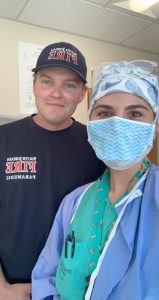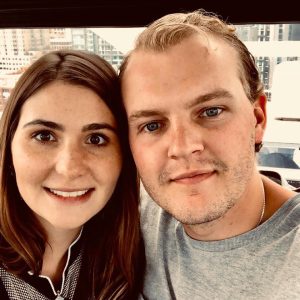We Weren't Meant to Take On Vasculitis Alone
Kayden Carter, an active firefighter and paramedic from Utah, just returned from a trip to North Carolina visiting his wife’s family when he noticed the pain. With no regular gym to go to in North Carolina, Kayden had been running more than usual that week. So when the bottoms of his feet flared in pain, he figured it was just from running. To be safe, he saw a podiatrist who gave him orthotics, told him he had plantar fasciitis, and sent him on his way. 
A week later, a burning sensation filled his legs and he struggled to walk. Still, he dismissed it. But as he began to cough up blood and had to cancel a trip with his wife to Hawaii, he became concerned: Was something more serious going on? At every visit to the doctor’s office, his inflammation markers would rise, but multiple doctors continued to turn him away without explanation for his mysterious symptoms. When he awoke one morning barely able to stand, his wife and parents had had enough of waiting for answers; he needed help. They drove him to the ER. Kayden remembers feeling sad and confused: “Rather than making memories with my wife on the beach in Hawaii, we were making unwanted memories in the hospital. I couldn’t understand why I felt great a week prior and now was suddenly struggling to walk and coughing up blood.”
Kayden ended up spending 21 days in the ICU. On August 14, 2021 (his birthday), he was discharged with a new diagnosis: granulomatosis with polyangiitis (GPA) vasculitis.
Kayden loves his job. “As firefighters,” he said, “we work 48 hours each round with the same crew and it feels like home when I go to work.” As his health suddenly spiraled downwards, he struggled to reconcile his new self with the active person he was before. “It was very hard to deal with the limitations I had at the time,” he said. In fact, the sudden onset of his illness was so strange and unexpected that he decided not to tell anyone at work. “Honestly,” he said, “I thought I was making the symptoms up.” The fire station was two stories and when Kayden would get calls in the middle of the night, he remembers having to crawl down the stairs just to make it to the ambulance. Many times he thought to himself, “How am I supposed to help someone in need when I can’t even help myself?”

Eventually, Kayden had to stop working. For eight months, he struggled at home without income while still having to pay two thousand dollars a month for insurance. Like the family they are, the crew in his fire department rallied around him. They hosted a pancake breakfast in the community they serve and all the proceeds were given to him and his wife to assist with bills. Kayden is forever grateful: “I know I will not be able to repay or thank everyone who donated, but I hope that as I work in this community, if they ever call 911, I will be able to help them in a way they helped me and my family.”
Throughout the darkest moments of Kayden’s journey, his wife was his “rock.” “Sometimes,” he said, “I think being in the ICU bed was easier than what she was going through. She had just started medical school the same week I was hospitalized. She would leave school and come straight to the hospital to be with me. She was always so strong in front of me even though I am sure she had many breakdown moments. I definitely couldn’t have done this without her and my family by my side.”
But it was during his hospital stay that Kayden and his wife received news they never wished to hear: Repeatedly, doctors told them that because of Kayden’s Cytoxan infusions, they may never be able to have kids.
Almost two years after Kayden left the hospital, they defied the odds: Kayden’s wife gave birth to their first child, a daughter named Reese. Kayden said, “She is the greatest gift anyone could ever receive.” Fatherhood has shifted his view on the world after his diagnosis: “She has helped me find new meaning in life. Looking down and seeing her smile lets me know that life is good!”

Today, with the help of rituximab infusions and the support of his family, Kayden has returned to work as a full-time firefighter and paramedic. A life-long ice hockey player, he continues to play on men’s league teams and for the “Hoses” fire department team during their annual Guns and Hoses games. And he has a deeper appreciation for this life: “I have had many tough and challenging days,” he said, “but I believe this diagnosis and hospital stay has shown me that life can change at any moment. So enjoy each day as if it’s your last and surround yourself with the ones you love.”
For his family, he wants to continue to live well. “I want to be a good, healthy husband and dad to my daughter,” he said. “Family is everything and we weren’t meant to take on life alone.”
Written by Ashley Asti
